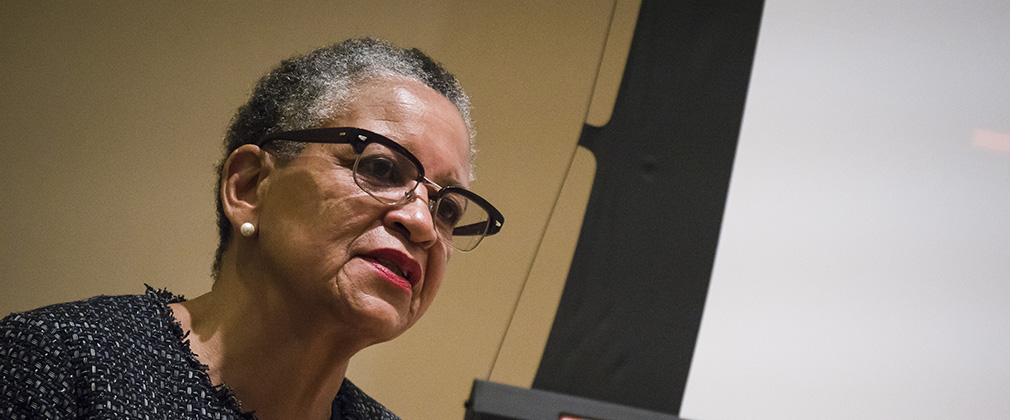Growing Plants, Growing People
The Center for A Livable Future Polly Walker Ecology Fund
May 8, 2018

Cathrine Sneed: Hope Is Here
When Cathrine Sneed was putting herself through law school, she fed her children on a shoestring. “Potato chips, a few hot dogs, some Kool-Aid, we were good,” she says. “Whatever we could afford.”
A few years later she found herself working with inmates at the San Francisco County Jail and discovered that their diets were nearly identical. But with this first job out of law school, she had improved her family’s meals. “The job meant a paycheck, which meant that I could buy my kids food,” she says. “It was the first time I felt like a had a future.”
For Sneed, hope for the future is one of the many things that work can provide. In addition to hope, she says, work provides a purpose, as well as motivation to overcome challenges. In 1982 she started the San Francisco County Jail Horticulture Project, which trained inmates to grow organic vegetables. She was adamant that they not sell their produce. Instead, they gave it away, and this act, like the act of working, provided more valuable life lessons. “Giving is a way for people who feel that they are nobody to make a contribution,” she says. “For the first time these people feel pride.”
Cathrine Sneed told the story of her work with inmates and former offenders at the Johns Hopkins Center for a Livable Future’s 6th Polly Walker Ecology Fund lecture, at Johns Hopkins’ Mason Hall last week.
The gardening program provided a kind of therapy—a place to heal, be encouraged and be re-born. After ten years of running the Horticulture Project, Sneed knew with certainty that volunteer work was not enough to rehabilitate former offenders. With the goal of reducing recidivism, in 1992 she started the Garden Project and another program, the Tree Corps, which has planted more than 10,000 trees in San Francisco. “What is needed is wages,” she says. “We need to put people to work.”
She reflected on how lucky she was, growing up in a household where her mother and father went to work every day. In contrast, most of the people she worked with at the jail had no experience with work. Through the Garden Project, made possible by a grant from a utilities company, Sneed gives young people, ranging in age from 11 to 22, experience with meaningful work during the summer. The kids do gardening and stewarding in the community, and, most importantly to Sneed, everyone gets a paycheck.
“The children are so enthusiastic at the opportunity to work and be outside. This is their opportunity to be children,” she says. “They’re skipping and singing and so happy, but they’re but also getting paid.” Last year, the program produced 100 tons of vegetables and landscaped 1400 acres, including land in Yosemite National Park. “The young people are meeting people who have jobs, who are going to school. They’re hungry as heck for it,” she says.
Sneed reflected on the nature of crime, as well. “It’s not just people doing bad things,” she says. She likes to show the children weeds growing in the cracks of a sidewalk as a metaphor for having hope. But she also uses it as a way of illustrating that, like plants, people will do what they need to do to survive. Without jobs, without food, people will resort to crime. “That’s what living things do,” she says. “They survive.”
Sneed told the audience that she’s spent 39 years cultivating hope, and she’s worked with the children and grandchildren of people from the early days of her projects. all Throughout San Francisco, she sees trees that her youngsters have planted; some of the trees are 20 feet tall, but Sneed knows that there is so much more growing to be done. “I had to work with children to remind me that change is possible and hope is here,” she says.
“I tell the kids, it’s good better best, never let it rest.”
The Center for a Livable Future presented the Polly Walker lecture in conjunction with the Department of Environmental Health and Engineering.
—Christine Grillo